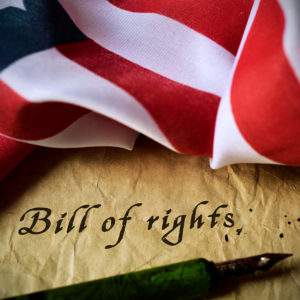December 15, known as Bill of Rights Day, celebrates the ratification by the states of the Bill of Rights, which happened on that date in 1791.
The Bill of Rights, or the first 10 amendments to the U.S. Constitution, not only helped secure popular support for the fledgling government but also provided a powerful weapon in defense of the people’s liberties.
The quiz below, from the Ashbrook Center at Ashland University in Ashland, Ohio, provides an opportunity for you to test your knowledge of the Bill of Rights and Bill of Rights Day.
1. Which president was responsible for signing legislation creating Bill of Rights Day?
A. George Washington
B. Abraham Lincoln
C. Franklin D. Roosevelt
D. Ronald Reagan
2. Which Founding Father was responsible for proposing the Bill of Rights in the first Congress in 1789?
A. George Washington
B. James Madison
C. Thomas Jefferson
D. Alexander Hamilton
3. Which Founding Father wrote in The Federalist Papers that a Bill of Rights was “unnecessary and dangerous”?
A. George Washington
B. James Madison
C. John Jay
D. Alexander Hamilton
4. What five freedoms are protected under the First Amendment?
A. Speech, Press, Religion, Petition, Expression
B. Speech, Press, Religion, Protest, Assembly
C. Speech, Press, Religion, Protest, Expression
D. Speech, Press, Religion, Petition, Assembly
5. Which of the following is NOT prohibited under the Eighth Amendment?
A. Cruel and unusual punishments
B. Double jeopardy
C. Excessive bail
D. Excessive fines
6. “The right of the people to be secure in their persons, houses, papers, and effects, against unreasonable searches and seizures” is protected under which amendment?
A. 4th Amendment
B. 5th Amendment
C. 6th Amendment
D. 7th Amendment
7. In which amendment would you find the ‘Takings Clause’ in the Bill of Rights (“nor shall private property be taken for public use, without just compensation.”)?
A. 4th Amendment
B. 5th Amendment
C. 6th Amendment
D. 7th Amendment
8. Where would you find the ‘Reserved Powers of the States’ in the Bill of Rights (“The powers not delegated to the United States by the Constitution, nor prohibited by it to the States, are reserved to the States respectively, or to the people.”)?
A. The Preamble
B. 1st Amendment
C. 9th Amendment
D. 10th Amendment
9. Which amendment, originally proposed with the Bill of Rights in 1789, was not ratified until 203 years later, in 1992?
A. 23rd Amendment, granting presidential electors for the District of Columbia
B. 24th Amendment, the anti-poll tax amendment
C. 25th Amendment, dealing with presidential disability and vice presidential vacancies
D. 27th Amendment, regulating congressional pay
10. One amendment originally proposed with the Bill of Rights in 1789 was never ratified. What was that amendment about?
A. Congressional representation
B. Congressional term limits
C. Presidential life terms
D. Limiting the number of justices on the Supreme Court
Answers: 1-C, 2-B, 3-D, 4-D, 5-B, 6-A, 7-B, 8-D, 9-D, 10-A

